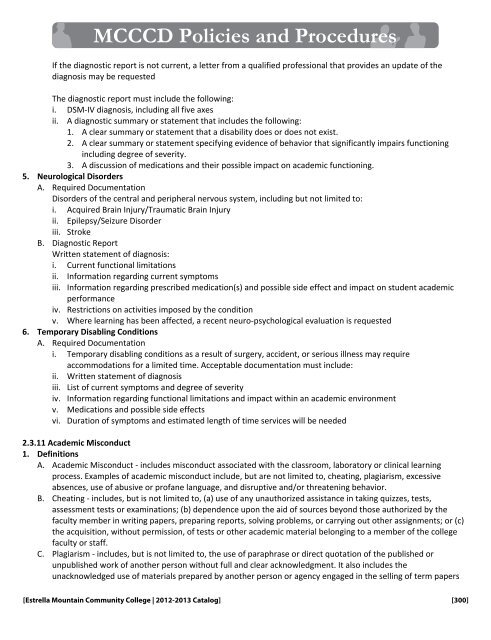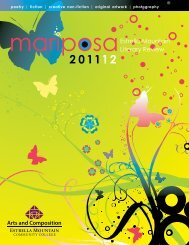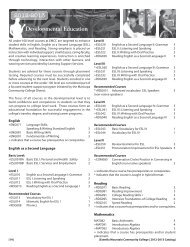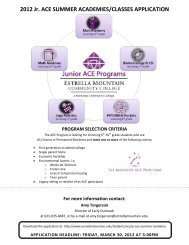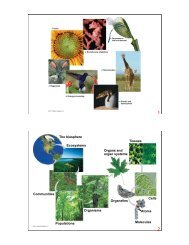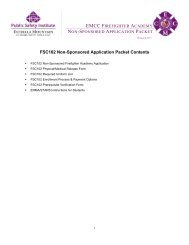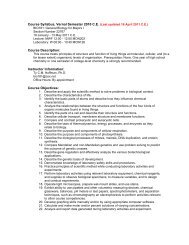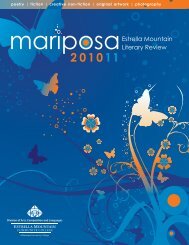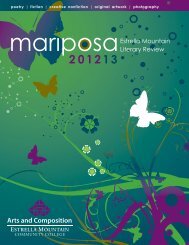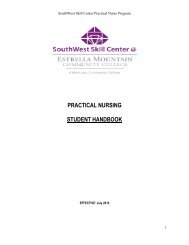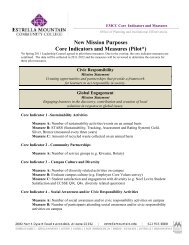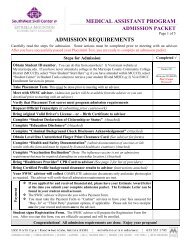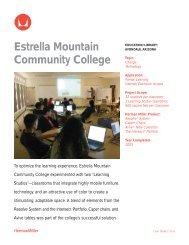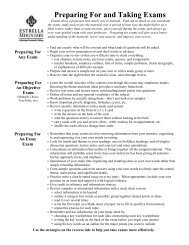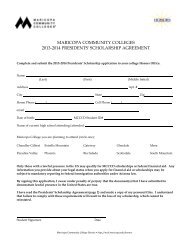MCCCD Policies and Procedures - Estrella Mountain Community ...
MCCCD Policies and Procedures - Estrella Mountain Community ...
MCCCD Policies and Procedures - Estrella Mountain Community ...
You also want an ePaper? Increase the reach of your titles
YUMPU automatically turns print PDFs into web optimized ePapers that Google loves.
<strong>MCCCD</strong> <strong>Policies</strong> <strong>and</strong> <strong>Procedures</strong><br />
If the diagnostic report is not current, a letter from a qualified professional that provides an update of the<br />
diagnosis may be requested<br />
The diagnostic report must include the following:<br />
i. DSM‐IV diagnosis, including all five axes<br />
ii. A diagnostic summary or statement that includes the following:<br />
1. A clear summary or statement that a disability does or does not exist.<br />
2. A clear summary or statement specifying evidence of behavior that significantly impairs functioning<br />
including degree of severity.<br />
3. A discussion of medications <strong>and</strong> their possible impact on academic functioning.<br />
5. Neurological Disorders<br />
A. Required Documentation<br />
Disorders of the central <strong>and</strong> peripheral nervous system, including but not limited to:<br />
i. Acquired Brain Injury/Traumatic Brain Injury<br />
ii. Epilepsy/Seizure Disorder<br />
iii. Stroke<br />
B. Diagnostic Report<br />
Written statement of diagnosis:<br />
i. Current functional limitations<br />
ii. Information regarding current symptoms<br />
iii. Information regarding prescribed medication(s) <strong>and</strong> possible side effect <strong>and</strong> impact on student academic<br />
performance<br />
iv. Restrictions on activities imposed by the condition<br />
v. Where learning has been affected, a recent neuro‐psychological evaluation is requested<br />
6. Temporary Disabling Conditions<br />
A. Required Documentation<br />
i. Temporary disabling conditions as a result of surgery, accident, or serious illness may require<br />
accommodations for a limited time. Acceptable documentation must include:<br />
ii. Written statement of diagnosis<br />
iii. List of current symptoms <strong>and</strong> degree of severity<br />
iv. Information regarding functional limitations <strong>and</strong> impact within an academic environment<br />
v. Medications <strong>and</strong> possible side effects<br />
vi. Duration of symptoms <strong>and</strong> estimated length of time services will be needed<br />
2.3.11 Academic Misconduct<br />
1. Definitions<br />
A. Academic Misconduct ‐ includes misconduct associated with the classroom, laboratory or clinical learning<br />
process. Examples of academic misconduct include, but are not limited to, cheating, plagiarism, excessive<br />
absences, use of abusive or profane language, <strong>and</strong> disruptive <strong>and</strong>/or threatening behavior.<br />
B. Cheating ‐ includes, but is not limited to, (a) use of any unauthorized assistance in taking quizzes, tests,<br />
assessment tests or examinations; (b) dependence upon the aid of sources beyond those authorized by the<br />
faculty member in writing papers, preparing reports, solving problems, or carrying out other assignments; or (c)<br />
the acquisition, without permission, of tests or other academic material belonging to a member of the college<br />
faculty or staff.<br />
C. Plagiarism ‐ includes, but is not limited to, the use of paraphrase or direct quotation of the published or<br />
unpublished work of another person without full <strong>and</strong> clear acknowledgment. It also includes the<br />
unacknowledged use of materials prepared by another person or agency engaged in the selling of term papers<br />
[<strong>Estrella</strong> <strong>Mountain</strong> <strong>Community</strong> College | 2012-2013 Catalog] [300]


